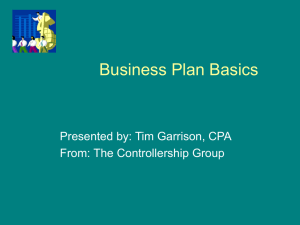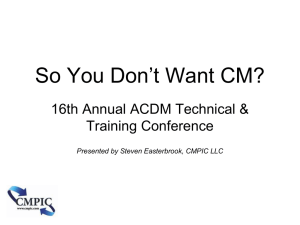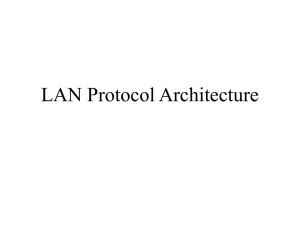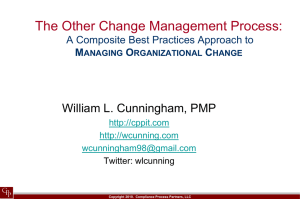Presentation
advertisement
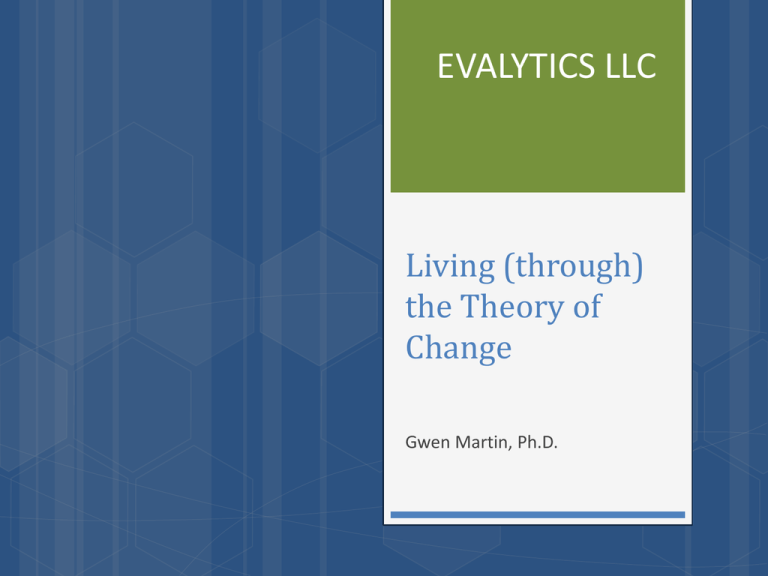
EVALYTICS LLC Living (through) the Theory of Change Gwen Martin, Ph.D. Evalytics LLC What is Theory of Change? WHAT & HOW your organization will accomplish what it believes is needed to be successful. Evalytics LLC 5 Key Elements of Theory of Change (ToC) WHAT = Results, Outcomes WHO = Target population, beneficiary HOW = Strategies, activities, actions, partners WHERE = Context WHY = Reasons, assumptions Evalytics LLC Why Bother? • • • • • Good for you. Many funders require. Demands breadth & depth of thinking. Provides evidence of what does/does not work. Makes the organization stronger. Evalytics LLC How different than a Logic Model? • • • • Not programmatic. Requires greater substantive knowledge of what is required to accomplish results. Strategy focus. Community focus. Evalytics LLC Learning Strategy Simple to Complex Try it on something you know intimately Ask questions Revise, refine, measure Evalytics LLC Illustrative Example Evalytics LLC WHAT? Not aggressive WHO? August & all other dogs benefit; people benefit HOW? Health, training, specialists, consistency, behavioral rewards WHERE? When around other dogs; on walks; at home with dogs & cats WHY? It’s possible; worthwhile; safety is important; resources available August ToC Questions: Is the RESULT (WHAT) clear and actually possible? What am I willing to do? How much time am I willing to devote to this? What back-up strategies are possible? Are there alternative solutions? What happens if I fail? Evalytics LLC Check health Interview trainers Purchase training gear, crate, bed Develop exercise and practice regimen DO IT! Resources: Veterinarian Trainers Time, $$, Patience Short-Term Outcomes Intermediate Outcomes Follows commands Not aggressive when sees other dogs 90% of the time Walks on leash 15 minutes without incident August Theory of Change Lives harmoniously with dogs & cats 90% of the time Evalytics LLC What would you add/delete? Evalytics LLC Theory of Change Examples thank you, Bill Moore Communities for Teaching Excellence Legacy LA Empowers youth to become leaders in their lives and their communities Accountability Lab TIG Theory of Change 2010 Improving Supply Chains for Community Care Management of Chronic Diseases Evalytics LLC REACH Foundation’s Rural Health Initiative (RHI) Grantees: 3 rural/semi-rural areas in Missouri and Kansas Broad, inclusive, community-wide effort to use innovation to make significant impact on access to and quality of health care for the underserved. Evalytics LLC Rural Health Initiative The overarching goal for the Rural Health Initiative (RHI) is to create a new way of investing in rural counties that promotes lasting change, ultimately impacting health indicators by increasing access to healthcare and reducing inequities for the unserved and underserved. RHI Draft Theory of Change; Feb. 2013 Foundational Capacity Reflection/ Evaluation Community Core Team Backbone Organization Early Outcomes Intermediate Outcomes Strengthened Individual Skills More effective Community Organizations and Institutions Long Term Outcomes Common Agenda/ Shared Vision; Community Agenda Shared Measurement System Continuous Communication Locally-Defined and Selected Intervention(s) Community Engagement Larger Stakeholder Group Diverse Inclusive Citizen Participation Expanded Leadership Base Consistent Tangible Progress Toward Goals Mutually-Reinforcing Activities among participants Better Resource Utilization by The Community Increased Access Reduced Health Disparities Reflection/ Evaluation Flexible Supports Throughout All Stages of the Theory of Change Process: Technical Assistance, Site Level Facilitation, Network Weaving, Local Data/Trends, Evaluation, & Funding Blue Font= Collective Impact conditions that support change (Kania and Kramer, 2011) Green font = Capacity Building outcomes that can be used to monitor change (Aspen Institute, 1996 ) Evalytics LLC RHI Framework in the 3 Counties Innovation Collective impact Network weaving Capacity building Evalytics LLC REACH Foundation’s Theory of Change for this initiative Did it work for REACH? Did it work for the counties (grantees)? How might it have been differently constructed? What was learned as this ToC was implemented? Evalytics LLC Value of a Theory of Change • • • • • Think about what you are trying to achieve and what is required to get there. See relationships between resources and activities now and across time. Share your vision with community members, current/potential funders, etc. Identify where changes may be needed over time. Identify what you want to evaluate. Evalytics LLC Theory of Change Process • • • • • Identify the problems (barriers) that are hindering access, keeping citizens from improving their health, or are creating disparities in health. Engage your network and community in dialogue to refine thinking and surface new ideas. Identify your goals (impact). Identify the changes in capacity, community, personal behavior, policy, etc that will need to occur in order for the goals to be achieved (outcomes). Seek out strategies that have been shown to bring about the outcomes. Evalytics LLC Allen County Brought new and valuable partners to the table Leaders learned first-hand about underserved through programming Extended to county-wide planning Evalytics LLC Cass County Maintained a committed core group Used ACA as vehicle to engage others Stepped back, looked for organizational home Evalytics LLC Lafayette County Built outreach effort and folded in need for ACA navigators Opened a clinic to provide direct services Obtained FQHC status Continued outreach efforts Evalytics LLC Questions?
